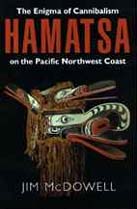Hamatsa: The Enigma of Cannibalism on the Pacific Northwest Coast

Hamatsa
The Enigma of Cannibalism on the Pacific Northwest Coast
by Jim McDowell
$21.95
- Spring 1997
- print ISBN: 978-0-921870-47-0 (0-921870-47-7)
- ebook ISBN: 978-1-55380-088-0
- 6″ x 9″ Trade Paperback, 300 pages
- History, Native Studies, Pacific Northwest Coast
- Out of print
For more the 200 years, controversy has simmered over the subject of cannibalism on the Pacific Northwest Coast. So heated has the topic become that many scholars have hesitated to engage in the debate. Now, using an interdisciplinary, cross-cultural approach, historian Jim McDowell offers a comprehensive study of cannibalism on the coast.
Beginning with the many supposed “man-eating” incidents recorded by European and American explorers and traders who visited Nootka Sound between 1744 and 1884, McDowell shows how the accounts were coloured by a “cannibal complex” among the Western observers. McDowell then revisits the ground-breaking work of Franz Boas and other anthropologists to reinterpret cannibalism as it was practised in the secret hamatsa ceremony — ritual cannibalism designed to strengthen and perpetuate Native communities.
Presenting the most complete discussion of the hamatsa to date, McDowell demonstrates the spiritual profundity of the ceremony (which continues today in various forms) and its intended purpose in coping with the dark forces of the world. Whereas the early explorers abhorred the gustatory cannibalism they believed they were observing, McDowell reveals that the ritual cannibalism of the hamatsa has much to teach the West in its present spiritual uncertainty and confusion.
Click here to read an excerpt from the introduction to Hamatsa.
Reviews:
“A controversial yet strangely compelling topic . . . After careful re-evaluation of the historical and anthropological sources, Jim McDowell has concluded that ritual consumption of human flesh and corpse-eating — particularly as Franz Boas reported among the Kwakiutl hamatsa societies — persisted into our era.”
—Christon Archer, Professor of History, Calgary“One of the 100 most important books on British Columbia.”
—Alan Twigg



